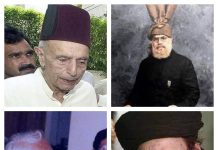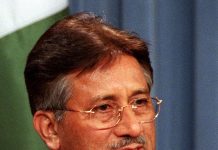Monitoring Desk
Prime Minister Imran Khan has said Pakistan wants “even-handed treatment” from the United States with respect to India, especially on the Kashmir issue.
In an interview with German weekly news magazine Der Spiegel on Saturday, he warned that the region was a hotspot and could flare up at any time.
“That’s why we expect the US, as the strongest country in the world, to be even-handed, whoever becomes president. The US thinks India will contain China, which is a completely flawed premise,” Imran Khan said.
He said that India is a threat to its neighbours, to China, Bangladesh, Sri Lanka and to Pakistan. It has the most extremist, racist government on the subcontinent. It is a fascist state, inspired by the Nazis in the 1920s and 30s,” he added.
The premier’s comments come days after the US and India signed a pact to share sensitive satellite and map data.
With the US elections just a few days away, Imran refrained from saying which candidate had a better shot at winning.
“Joe Biden is in front in opinion polls, but Donald Trump is very unpredictable because he’s not like normal politicians. He plays by his own rules,” he said.
Imran said when he started his own party he had to do a lot of “out-of-the-box thinking”. “[PTI] was the first to rely on social media and the first to attract the youth to our rallies.”
Asked whether he saw similarities between himself and the US president, Imran said: “We [PTI] had to be very unorthodox and, in some ways, Donald Trump does too.”
During the interview, the premier said Pakistan had “nothing to do with the terror attacks on 9/11”.
Prime Minister Imran Khan says South Asian region is a hot-spot that could be flared up at any time while India is a threat to its neighbours, including Pakistan@PakPMO @ImranKhanPTI @derspiegel https://t.co/Z8RFqqnimS
— Radio Pakistan (@RadioPakistan) October 31, 2020
“Al Qaeda was in Afghanistan. After 9/11, we should not have allowed our army to become involved in the war. I opposed it from day one. The US put pressure on us, and the military dictator General Pervez Musharraf succumbed to that pressure.”
When the interviewer pointed out that, at the time, Pakistan, Saudi Arabia and the United Arab Emirates were the only countries supporting the Taliban, he replied: “Don’t forget, Osama bin Laden was a hero in the 1980s. He supported the Mujahideen against the Soviets in Afghanistan, and he was backed by both the CIA and Pakistan.
“It was Pakistan’s right to recognise the Taliban but Pakistan had no control over the Taliban. When Pakistan asked the Taliban to hand over Bin Laden to the Americans, they refused.”
Asked how Pakistan was able to bring the Taliban to the negotiating table, the premier said the country had leverage due to 2.7 million Afghan refugees in Pakistan.
However, he added that no one can predict the way things will go in Afghanistan. “What I can say is that after Afghanistan, the country that wants peace the most is Pakistan.
“We have lost 70,000 people in this conflict, and our tribal areas adjacent to the Afghan border have been devastated during the last 15 years. Half of the people in these areas have become internally displaced.”
Imran was also asked about the recent visit of Afghan politician and Hizb-i-Islami leader Gulbuddin Hekmatyar to Islamabad. He said that he had spoken to Dr Abdullah Abdullah, leader of Afghanistan’s High Council for National Reconciliation, prior to speaking to Hekmatyar.
“We have no favourites in Afghanistan. Our only interest is that the future government in Kabul does not allow India to operate from there against Pakistan,” he said, adding that Hekmatyar took part in the elections and accepts the constitution of Afghanistan.
He also regretted the “double image” given to Pakistan. “It all started in the 1980s, after the Iranian revolution. Many in the West began looking at Muslim countries as if there was a divide between liberals and fundamentalists — a very artificial assessment.
“Muslim countries are no different from other communities. All communities are divided into moderates, which make up the majority, and the extremists.”















